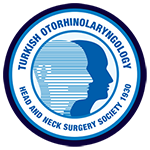ABSTRACT
Objective:
The aim of this study is to compare traditional cold knife tonsillectomy and plasma knife tonsillectomy.
Methods:
In this study, 15 patients underwent cold knife tonsillectomy, 15 patients underwent plasma knife tonsillectomy. The patients were then followed up in the postoperative days.
Results:
The operation time and intraoperative blood loss in cold knife tonsillectomy group was significantly greater than the plasma knife group (p<0.001). The mean pain scores in the plasma knife group was significantly higher than the dissection group (p=0.006). Pain scores in each follow up time for each group was not statistically significant (p>0.05). Postoperative complications were similar for both groups (p=0.224). There was no significant correlation of complications and age (p=0.921). Operation time of the patients who had complications was not different from the patients who did not have complications (p=0.086). Pain scores in every follow up time for both groups was not significantly different (p>0.005).
Conclusion:
According to this data, plasma knife tonsillectomy was not found superior to cold knife tonsillectomy in the postoperative pain and complications but had positive effects on operation time and blood loss.
ÖZET
Amaç:
Geleneksel bir yöntem olan soğuk bıçak tonsillektomi ile plazma knife tonsillektomi tekniğinin sonuçları karşılaştırıldı.
Yöntemler:
Onbeş hastaya soğuk bıçak tonsillektomi, 15 hastaya plazma knife ile tonsillektomi uygulandı, hastalar ameliyat sonrası takip edildi.
Bulgular:
Soğuk bıçak tonsillektomi grubunda operasyon süresi ve kanama miktarı istatistiksel anlamlı olarak daha fazla bulundu (p<0,001). Plazma knife grubunda postoperatif genel ağrı skoru ortalaması soğuk bıçak grubuna göre anlamlı olarak daha yüksek bulundu (p=0,006). Gruplar her bir izlem zamanı içerisindeki ağrı skorları açısından değerlendirildiğinde ise, iki grup arasında istatistiksel olarak anlamlı farklılık görülmedi (p>0,005). Gruplar arasında komplikasyon görülme oranı açısından istatistiksel olarak anlamlı fark yoktu (p=0,224). Komplikasyon ile yaş arasında istatistiksel olarak anlamlı birliktelik görülmedi (p=0,921). Komplikasyon görülen ve görülmeyen olgularda operasyon süresi açısından istatistiksel olarak anlamlı farklılık yoktu (p=0,086) ve her bir izlem zamanı içerisinde ağrı düzeyleri yönünden istatistiksel olarak anlamlı farklılık yok idi (p>0,005).
Sonuç:
Plazma knife ile tonsillektomi tekniği soğuk bıçak tonsillektomiye göre postoperatif ağrı ve komplikasyonlar açısından çok farklı bir kazanç sağlamazken, daha kısa operasyon süresi ve daha az kan kaybı açısından olumlu etkisi olduğu kanaatine varılmıştır.



